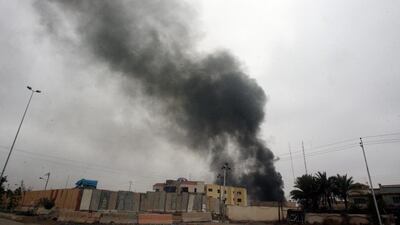FALLUJAH, Iraq // The Iraqi government has lost Fallujah to Isil, the Islamic State of Iraq and the Levant, in a battle that recalled the city’s darkest days as an insurgent stronghold after the 2003 US-led invasion.
Parts of Fallujah and Ramadi, in Anbar province west of Baghdad, had been held for days by fighters from the Islamist militant group linked to Al Qaeda.
The fighting began in the Ramadi area on Monday, when security forces broke up an anti-government protest camp set up after demonstrations in late 2012 against what Sunnis say is the marginalisation and targeting of their community by prime minister Nouri Al Maliki’s Shiite-majority government.
The violence spread to Fallujah, and the withdrawal of security forces from areas of both cities cleared the way for militants to move in. “Fallujah is under the control of Isil,” a senior security official in Anbar said, while the city’s outskirts were in the hands of local police.
Inside Fallujah, Isil seemed to be in control, with no security forces or members of the anti-Al Qaeda Sahwa militia on the streets.
The Iraqi ground forces commander, Gen Ali Ghaidan Majeed, said security forces had killed 25 Isil fighters in Albufaraj, near Ramadi, and 30 in Garma, close to Fallujah. He said police and tribesmen were hunting for militants in Ramadi, with army support.
Eight soldiers were also killed in areas of Ramadi and Fallujah.
Gen Majeed said there were three groups involved in the fighting: security forces and allied tribes, Isil, and forces of the anti-government “Military Council of the Tribes”.
Mr Al Maliki vowed to eliminate militant groups in Anbar. “We will not back down until we end all terrorist groups and save our people in Anbar,” he said.
On Friday alone, more than 100 people were killed in Ramadi and Fallujah, in the country’s deadliest single day in years.
Hundreds of gunmen, some carrying the black flag of Al Qaeda, gathered at outdoor prayers in central Fallujah on Friday, and one militant announced that “Fallujah is an Islamic state”.
Many residents fled Fallujah after it was seized by militants, and others are preparing to stay through what all fear will be a major battle as security forces push to retake it.
The city’s streets were empty except for cars navigating backstreets in an attempt to escape clashes and shelling on the outskirts.
Five days after the killing began, rubbish is piled up in some streets, and others are littered with bullet casings from the fighting.
Most shops are closed, but bakeries remain open, and dozens of people queue to buy food.
All electricity in the city is cut, and there is no fuel to operate the generators that normally plug gaps in government-provided power.
The city was the target of two major assaults after the US-led invasion, in which American forces engaged in some of their heaviest fighting since the Vietnam War.
American troops fought for years, aided from late 2006 by Sunni tribesmen in the Sahwa militia forces, to wrest control of Anbar from militants.
US forces suffered almost a third of their total Iraq fatalities in Anbar.
But two years after US forces withdrew from the country, the power of militants in the province is again rising.
Isil is the latest incarnation of an Al Qaeda affiliate that lost ground from 2006, as Sunni tribesmen and former insurgents joined US troops against Islamist militants in a process that began in Anbar and came to be known as the “Awakening”.
But the group has made a striking comeback following the US withdrawal and the outbreak of Syria’s civil war in 2011.
Charles Lister, a visiting fellow at the Brookings Doha Centre, said its “strength and territorial control and influence has been expanding in Anbar for some time”, although mainly in rural desert areas.
The operation to close the Ramadi protest camp pushed Sunni tribes into conflict with the government, and Isil “has ridden this wave of popular Sunni anger”, Mr Lister said.
Mr Al Maliki had called the protest camp a “headquarters for the leadership of Al Qaeda”, and had long sought its closure.
But its removal has caused a sharp deterioration in the security situation.
And while the closure has removed a physical sign of Sunni grievances, the perceived injustices that underpinned the protest have not been addressed.
Violence in Iraq last year reached a level not seen since 2008, when it was just emerging from a brutal period of sectarian killings.
Sunni anger fuelled the surge in unrest, boosting recruitment for militant groups and decreasing cooperation with security forces, while the civil war in Syria also played a role, experts say.
* Agence France-Presse

